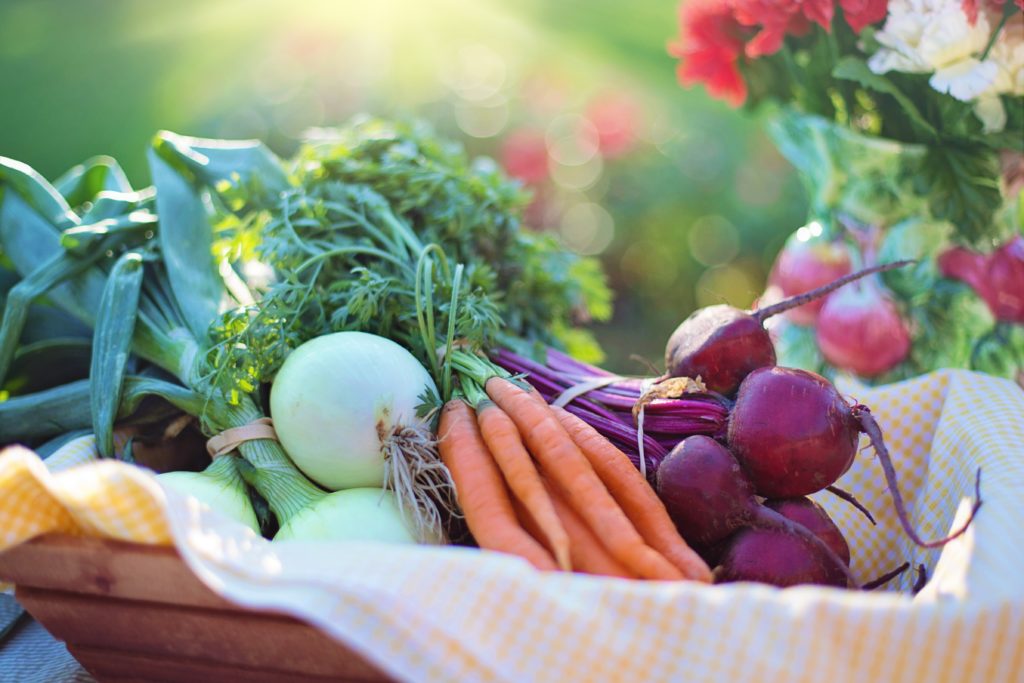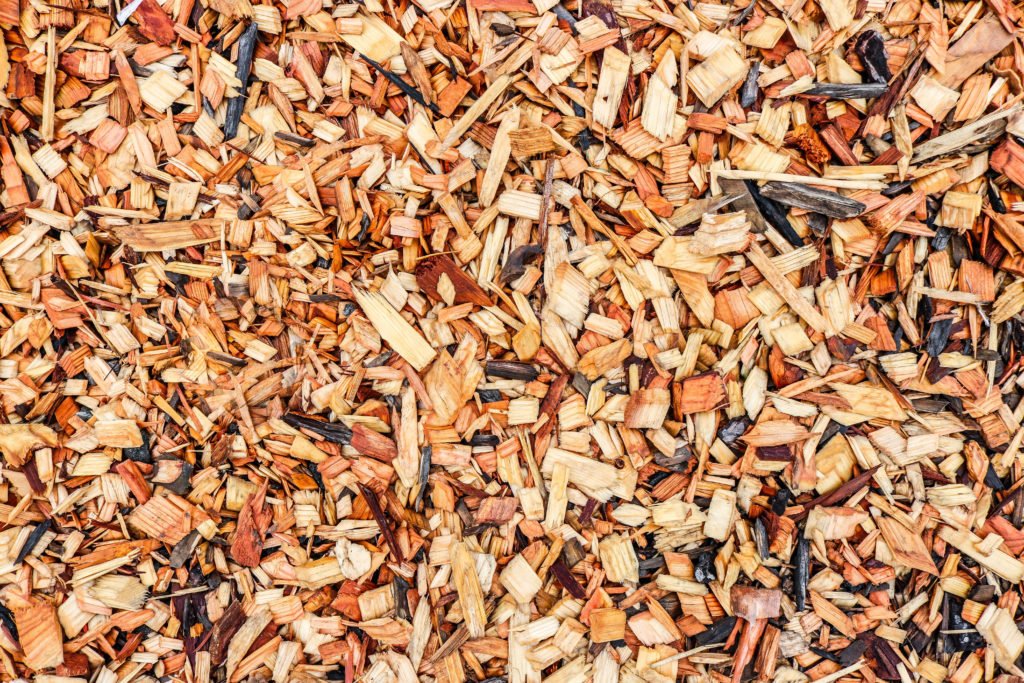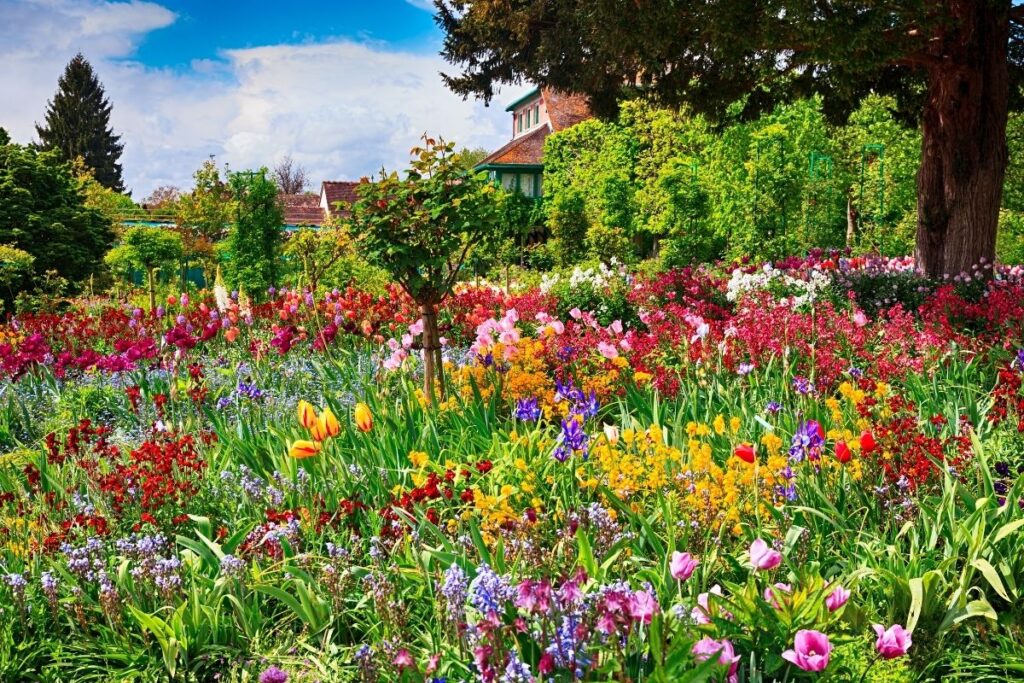Raspberry plants are great additions to any garden, patio, or yard. They’re easy to grow, they produce delicious fruit year after year, and they attract butterflies and birds.
The only problem is that once you’ve had fresh raspberries right off the plant, there’s no going back!
When Will My Raspberries Be Ready for Harvesting?
This is one of the most frequently asked questions we get here at AHappyGarden.com — and we certainly understand why! You’ve taken the time and made the effort to plant some raspberry bushes and start cultivating a healthy patch of delicious berries — but when will they be ready?
Let’s have a look at the raspberry life cycle so that we can get a better idea of when to expect berries on your plants.
The primocane is the first cane produced after planting your raspberries, and it will produce fruit in its first year of growth. The flowers are hermaphroditic (have both male and female reproductive organs) and are pollinated by bees or other insects.
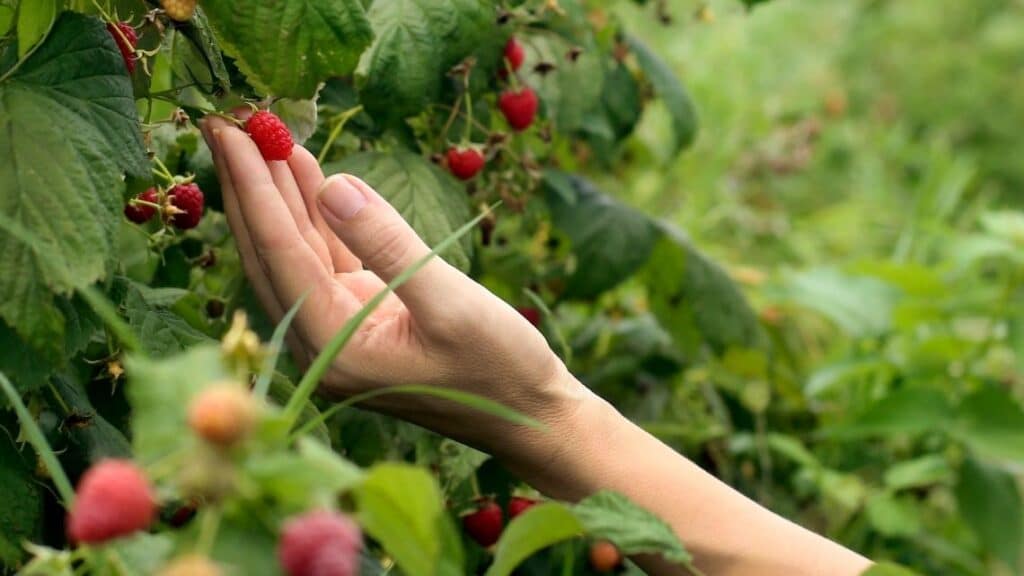
Individual canes of rasp die off after fruiting in the fall, and the plant goes dormant for the winter. In its second year of life, a raspberry bush will once again produce two different types of canes – the primocanes and floricanes. The primocane that grew in your first season will become a floricane.
This cane is much more slender than the previous year’s growth and does not produce fruit until it has been through winter dormancy. It produces flowers during its second year, but those flowers cannot be pollinated as there are no male parts on last year’s primocanes.
This is why you’ll often hear people say to avoid fertilizing raspberries at blooming time so as not to promote excessive vegetative growth over flowering later in the season.
Once the floricane has grown and flowered, it will produce fruit at the beginning of summer. The raspberry bush goes dormant in late summer so that it can survive winter once again.
When is Raspberry Harvest Time?
You’ve been waiting for this all year long, and there’s no doubt that you want to get the most out of your berries when they’re ready.
If you’ve planted your raspberries in early spring or fall, you’ll be happy to know that they’ll likely be ready for harvest before the end of their first season! Each plant should yield several pounds of plump, luscious raspberries within a few short weeks after planting.
Those who have planted them in summer may wait up to 3 months for their bushes to mature enough so that they can bear fruit. At this point your raspberry plants should begin producing throughout the remainder of their first summer and into the following fall.
In botany, a plant is considered ripe once it’s harvested fully mature fruit. This doesn’t mean that the fruit can be eaten immediately – in fact, most fruits need some time in order to ripen after they have been picked.
Raspberries will NOT continue to ripen after being picked from the plant, so you’ll always want to pick raspberries at their peak of deliciousness, and knowing when they are ready ensures that you’ll get the most out of them.
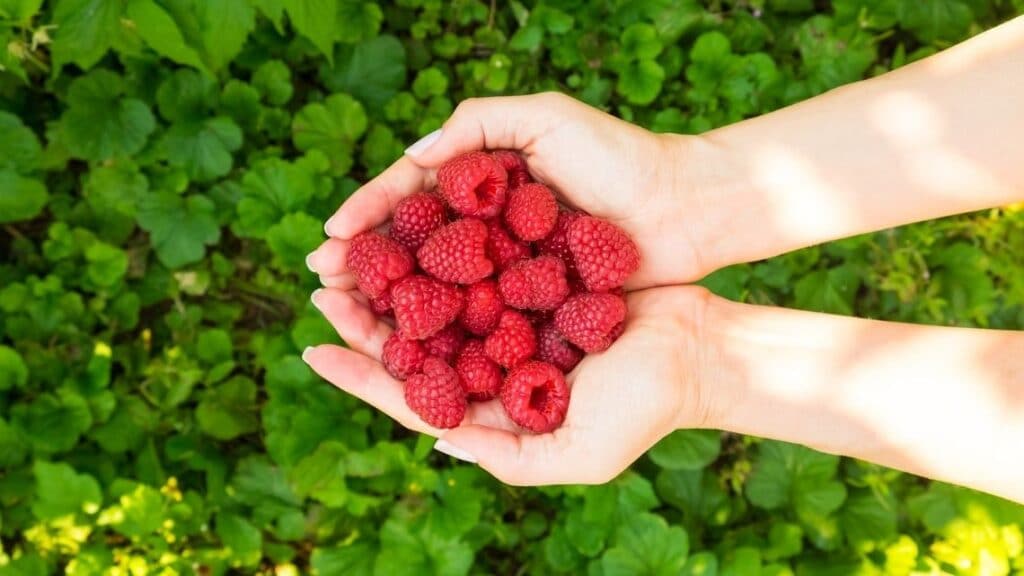
You’ll often find that raspberry plants produce two main crops during one season – an early crop and a late crop. For most people with limited space, it’s best to choose just one of these harvests to maximize production per bush. This way, raspberries can grow throughout the entire year without interference from humans!
Early Season Berries: While blackberries are usually thought of as America’s first berry, it was actually wild red raspberries that Native Americans foraged for. Cousins to blackberries, red raspberries grow in a variety of colors and are delicious eaten fresh or used in any number of dishes from pies to jams.
The majority of raspberry plants produce their fruit during the early season. Depending on your climate, this can be anywhere between late spring and mid-summer.
Late Season Berries: Late season berries ripen up to two months after the first, typically from mid-August to early October. Black raspberries are a late season variety that can often be harvested through the first frost of winter. Raspberry plants also flower and produce fruit year after year – unlike many other fruits – so you can expect a plentiful harvest every summer of your life
How to Harvest Raspberries
Raspberries are highly perishable – direct sun and warm temperatures cause them to spoil quickly – so pick them as close to when you’re going to eat them as possible. For peak flavor, allow raspberries to ripen fully on the plant before picking them.
Raspberries are easiest to harvest when they’re fully ripe. They’ll come off the stem easily (practically fall off into your hand) if you give them a gentle tug. If they are being stubborn and don’t want to come off, it means they aren’t ready yet.
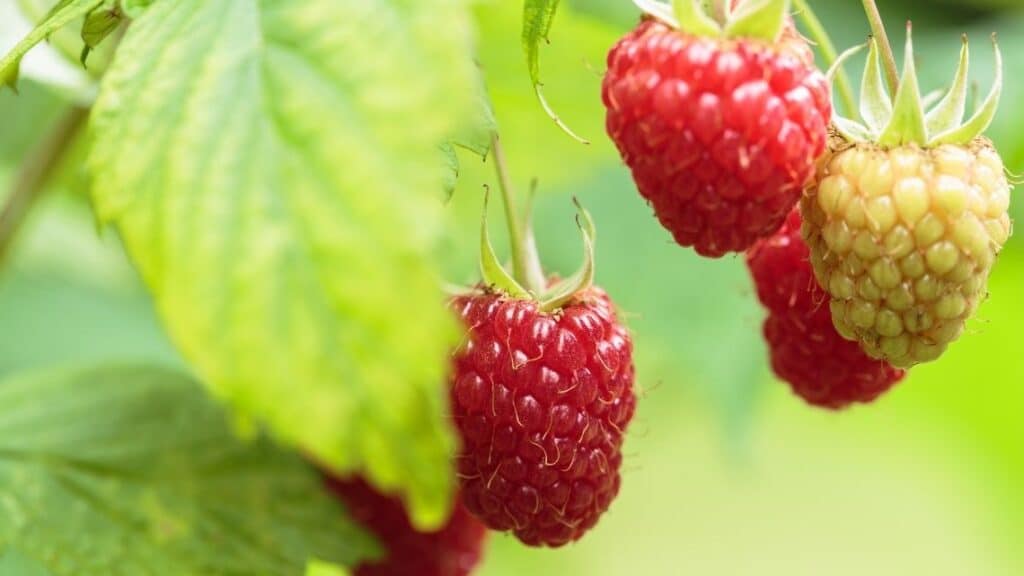
I like to bring a container out with me when picking raspberries, but let’s be honest. They usually end up going straight into my mouth and I come back inside with an empty bowl – haha! This is why my son always comes out with me – he’s learned that’s the only way he’ll get any!
Just be sure that you don’t damage or uproot any of the canes! You’ll want to avoid pulling on the berry clusters as this might cause some branches to snap off. Heavy cane pruning will help increase future yields by promoting new growth.
In some cases, you will only be able to harvest part of a raspberry bush’s crop before frost hits. Just cut away any dead canes at ground level and leave the healthy ones intact until next season!
How long do raspberries last in the fridge?
If you are not going to eat your raspberries immediately, you want to store them dirty. Yes, you read that right. Don’t wash your raspberries if you aren’t going to eat them right away! The berries will deteriorate quickly and significantly if they get wet off the cane.
Raspberries should only be kept in the fridge for about two to three days after you pick or purchase them.
At room temperature, raspberries can last up to seven days after they are harvested. (Hah! They would never last this long in my house!)
Can Raspberries Be Frozen?
Yes, raspberries can be frozen! This is actually a great way to keep your raspberries longer if you did not get a chance to eat them all before they started going bad in the fridge.
Before freezing any type of fruit (including raspberries), it is important that you first wash and dry it thoroughly before putting it into the freezer.
How to Freeze Raspberries
The best way is to freeze them individually at first so that you don’t end up with a large chunk. Place washed and dried raspberries onto a cookie or baking sheet in a single layer, making sure they do not touch one another.
Freeze the tray overnight and then once the raspberries are frozen, you can then transfer them into an airtight container.
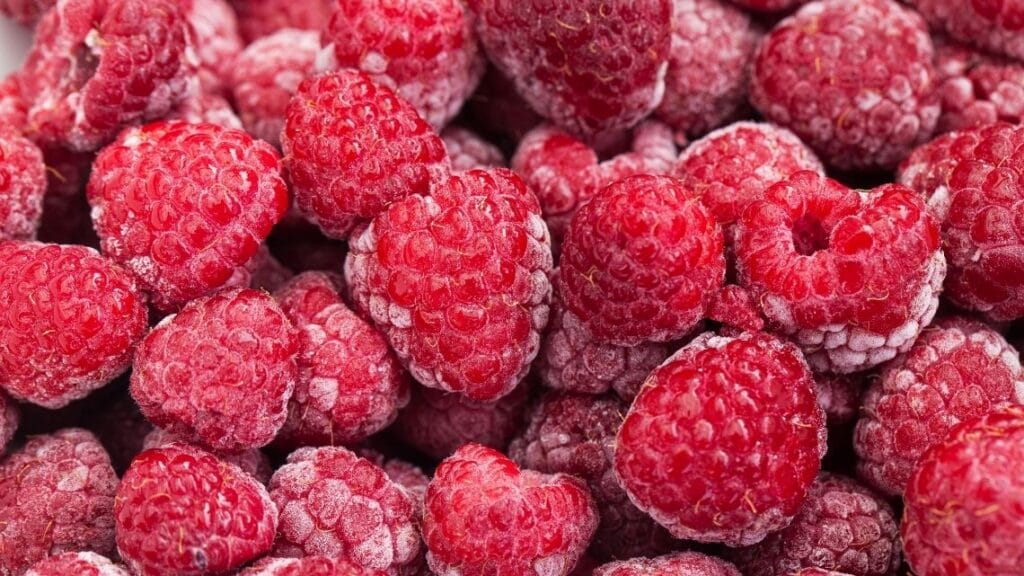
Freezing raspberries is not the only way you can preserve their freshness longer. You can also turn your raspberries into jams or jellies that can last for up to one year in the fridge!
Can Raspberries Be Cooked?
Yes, raspberries can be cooked! They’re delicious both ways: fresh and cooked. Most people like eating their raspberries plain as a simple, healthy snack. If you have some leftover fresh raspberries before they start going bad in the refrigerator, you might want to consider cooking up something tasty with them.
You can cook your raspberries and serve them as a simple raspberry sauce to use over desserts, such as ice cream or pancakes.
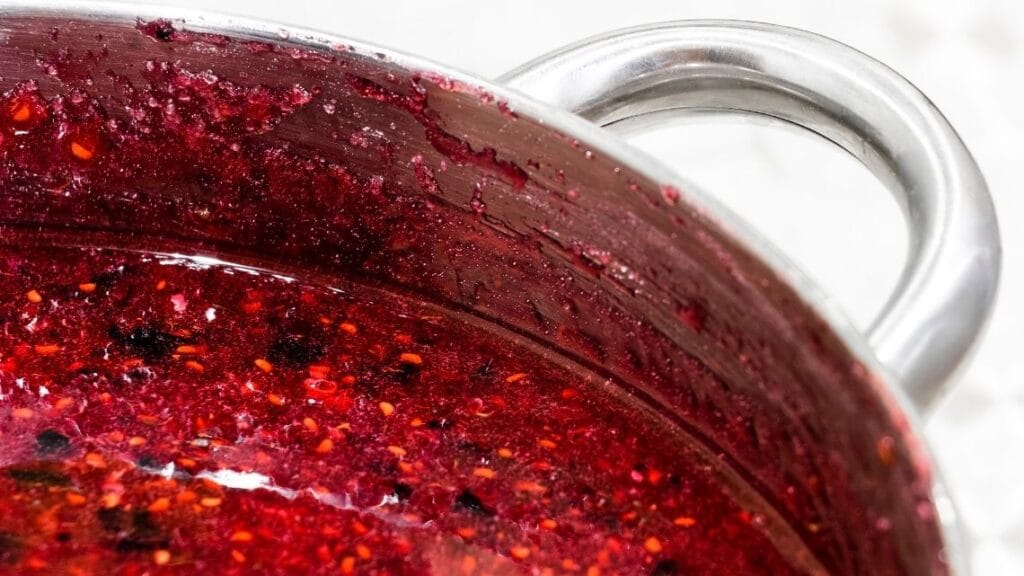
Another popular way of serving cooked raspberries is in baked goods like crisps and cobblers. You can even mix your cooked raspberries into pancake batter for a delicious twist on an American breakfast classic!
Raspberry Nutrition Facts
Raspberries are incredibly nutritious fruits that pack plenty of vitamins and minerals. They contain high levels of fiber, vitamin C, manganese, folate, potassium, and magnesium–all essential nutrients for achieving overall wellness and good health.
They also have anti-inflammatory benefits which protect the body from developing cancer cells. Additionally, antioxidants found in raspberries help promote eye health and protect the body from oxidative stress. They even make a great treat for your pet!
Raspberry Flavor Profiles
Raspberries have a sweet, yet tart taste that makes them a popular addition to many dishes. They add color and flavor to baked goods such as pies and cakes, pancakes, and muffins. Raspberries can be used to make jams or jellies that are rich in vitamin C with a strong raspberry flavor.
They’re also delicious when eaten raw when they’re at their ripest stage of freshness before going bad in the refrigerator. When they become too mushy for a simple snack, you can cook them up for an extra flavorful topping to use on your favorite desserts!
Raspberry Pairings
Raspberries pair well with plenty of other fruits. Pair them together in a fruit salad to add color and different flavor profiles. You can also mix your raspberries into plain yogurt for a berry-infused snack or breakfast parfait!
They’re delicious with almonds and pecans as well, which make an ideal topping for yogurt, salads and baked goods such as pies and berry cobblers. A combination of raspberries, blueberries, blackberries, and strawberries has been dubbed the “four-berry blend” because it features all four types of berries that combine to create one amazingly tasty treat!
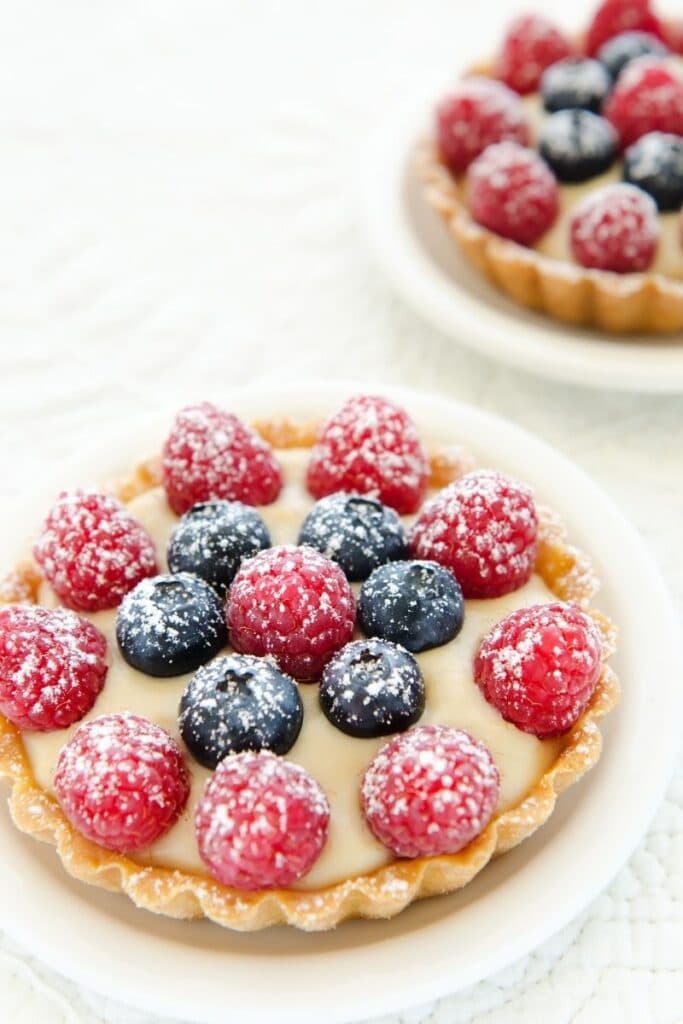
You can even eat your raspberry along with chocolate–who doesn’t love this sweet yet tart pairing?
Now you know what to do with all those delicious red raspberries hovering around your kitchen. You may want to plant some of these amazing berries today so you’ll have them whenever you like!
Happy harvesting and thank you for visiting A Happy Garden, where every day in the garden is a happy day!

